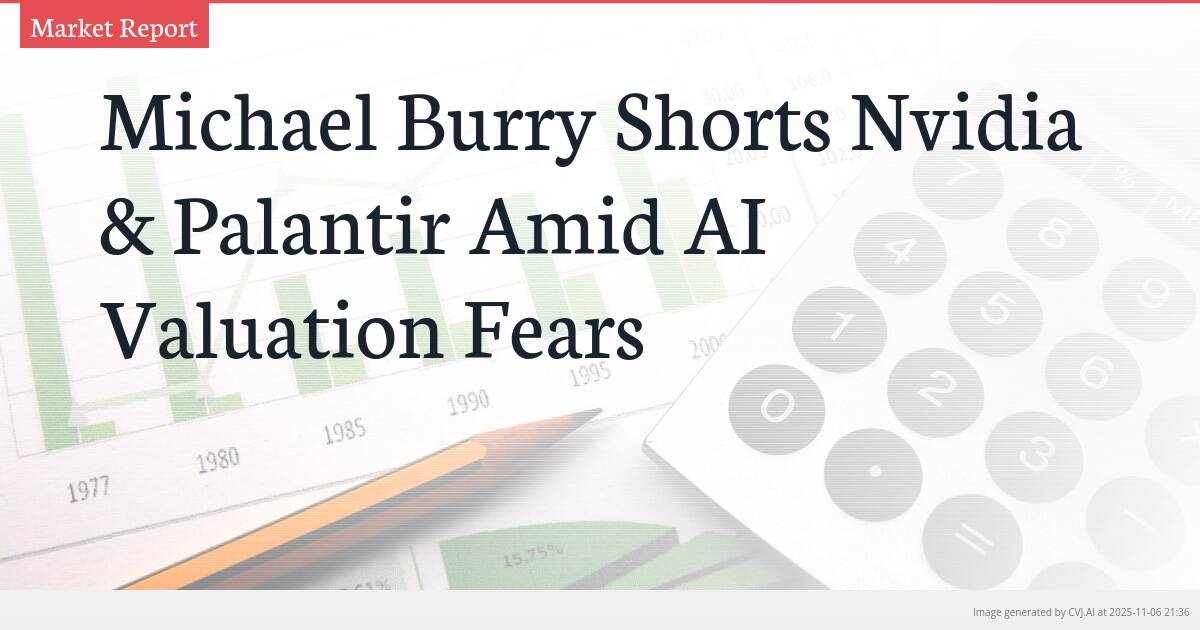This summary text is fully AI-generated and may therefore contain errors or be incomplete.
Introduction
Famed ‘Big Short’ investor Michael Burry has taken short positions against AI market leaders Nvidia and Palantir, signaling deep concerns about overheated valuations in the artificial intelligence sector. This dramatic move by the investor who famously predicted the 2008 housing crash comes as questions mount about whether current stock prices have disconnected from fundamental business metrics, potentially setting the stage for a significant market correction in high-flying AI names.
Key Points
- Michael Burry's short positions target two of the most celebrated AI companies in current markets
- Valuation concerns are emerging as stock prices appear to outpace fundamental business performance
- ETF strategies are being developed to enable investors to follow Burry's bearish investment thesis
The Big Short Investor's Bearish Bet
Michael Burry, the hedge fund manager immortalized in ‘The Big Short’ for his prescient bet against the subprime mortgage market, has now turned his skeptical eye toward two of the market’s most celebrated artificial intelligence companies. His announcement of short positions against both Nvidia (NVDA) and Palantir (PLTR) represents a direct challenge to the prevailing market narrative that has driven these stocks to extraordinary valuations throughout the current year. Burry’s track record of identifying market excesses gives this move particular weight among institutional and retail investors alike.
The United States-based investor’s decision to publicly disclose these short positions comes at a critical juncture for AI-focused equities. Both Nvidia and Palantir have been riding what many analysts describe as an ‘AI investing wave’ that has captivated market participants and driven significant portions of the broader market’s gains. However, Burry’s bearish stance suggests he sees parallels between current AI stock mania and previous market bubbles where valuations dramatically exceeded underlying business fundamentals.
Valuation Concerns in the AI Frenzy
Nvidia’s position as a dominant supplier of AI chips and Palantir’s specialized AI-powered data analytics platforms have made them darlings of the current market cycle. Their prominence in the artificial intelligence space has attracted massive investor interest, driving their stock prices to levels that now prompt serious questions about sustainability. The core concern, as signaled by Burry’s short positions, is whether current valuations properly reflect the companies’ actual financial performance and growth prospects.
The valuation debate centers on whether the market has properly priced the risks associated with these AI leaders. While both companies have demonstrated strong growth in their respective niches, the premium investors are paying for that growth has expanded to levels that historically precede corrections. This dynamic creates a scenario where even minor disappointments in earnings or growth projections could trigger significant price adjustments, making the companies attractive targets for short sellers like Burry who specialize in identifying overvalued assets.
The concentration of investor enthusiasm in a handful of AI-focused names like Nvidia and Palantir has created what some analysts describe as a ‘narrow market’ where a small group of stocks drives disproportionate market gains. This concentration risk amplifies the potential impact should sentiment toward these AI leaders shift, particularly if institutional investors begin questioning whether current stock prices have become detached from reasonable valuation metrics.
ETF Strategies for Bearish Positioning
Burry’s high-profile short positions have sparked interest in exchange-traded fund (ETF) strategies that allow investors to position themselves similarly without engaging in direct short selling of individual stocks. The development of these ETF-based approaches reflects the growing sophistication of retail and institutional investors seeking to capitalize on potential market corrections in specific sectors or individual companies.
These ETF strategies typically involve funds that track inverse performance of technology sectors or utilize options strategies to profit from declines in specific stocks. For investors concerned about AI stock valuations but unwilling to take on the unlimited risk profile of traditional short selling, these ETF vehicles offer a more controlled approach to expressing bearish views on companies like Nvidia and Palantir.
The emergence of specialized ETF products tailored to mirror bearish investment theses highlights how financial markets continue to evolve in response to prominent investor moves. As Michael Burry’s short positions against Nvidia and Palantir gain attention, the availability of these structured products makes it increasingly accessible for a broader range of market participants to position themselves in alignment with his skeptical view of current AI stock valuations.
📎 Read the original article on etftrends.com

